From the Latest Edition of the Newsletter
Does corporate engagement in social responsibility affect firm innovation? The mediating role of digital transformation
By Bui Quang Tuyen, Do Vu Phuong Anh, Nguyen Phuong Mai, To Quang Long
This study examines the relationship between corporate social responsibility (CSR) and firm innovation in the Vietnamese context. Using panel data and a quantile technique, the study explores the impact of different types of CSR on business innovation. The findings reveal that external and internal forms of CSR are interconnected and lead to enhanced innovative performance. The research also highlights the influence of digital transformation on CSR and corporate innovation, indicating a positive relationship between CSR, digital transformation, and firm innovation. This suggests that firms can foster innovation by adopting CSR practices and adapting to the digital landscape, even in the absence of effective institutions. Access the reading here.
Corporate social responsibility and export performance under stakeholder view: The mediation of innovation and the moderation of the legal form
By Antonio Martos-Pedrero, David Jiménez-Castillo, Vera Ferrón-Vílchez and Francisco Joaquín Cortés-García
This study focuses on the association between corporate social responsibility (CSR) and export performance, particularly in the case of exporters. By examining factors such as innovation and the legal form of the organization, the study aims to clarify the impact of CSR efforts on export performance. Findings from 107 agri-food companies indicate that CSR does not have a direct effect on export performance. However, the study reveals that innovation acts as a mediator in this relationship. Additionally, companies adopting associative legal forms, like cooperatives, benefit more from their CSR practices compared to non-associative legal forms. Download the reading here.
Corporate Responsible Innovation in Science and Technology Organisations: Including Indigenous Worldviews
Authors: Rafaela Costa Camoes Rabello, Katharina Ruckstuhl, Diane Ruwhiu, and Kirsty de Jong
This article highlights the importance of science and technology organizations adopting a broader range of worldviews and approaches when addressing global challenges. By avoiding a singular “Western science” approach, these organizations can better tackle wicked problems such as poverty, hunger, and climate change. The chapter presents a New Zealand case study where an organization strategically incorporates an indigenous innovation policy into its core activities. The study offers valuable insights for other science organizations, particularly in upstream or ideation phases, seeking to implement inclusive policies. Check the article here!
Research on Responsible Innovation Mechanism Based on Prospect Theory
by Xiaoyu Qu, Xiao Wang and Xutian Qin
This article presents research on a responsible innovation mechanism based on prospect theory. It emphasizes the importance of guiding enterprises to implement responsible innovation, especially in the context of the COVID-19 pandemic. The study constructs an evolutionary game model involving the government, enterprises, and consumers to analyze their strategic choices and influencing factors. The findings suggest that government incentives and disincentives can effectively promote responsible innovation, with enterprise enthusiasm increasing over time. The research provides valuable insights into the decision-making process and factors affecting responsible innovation, offering a theoretical reference for its implementation. Access the reading here.
Environmental collaboration, responsible innovation, and firm performance: The moderating role of stakeholder pressure
The authors are Samuel Adomako and Mai Dong Tran
This scientific article investigates how environmental collaboration affects firm performance through responsible innovation. Based on data collected from 225 firms, the study finds that a firm’s level of environmental collaboration positively influences responsible innovation, and this impact is greater when stakeholder pressure is higher. Additionally, the relationship between environmental collaboration and firm performance is mediated by responsible innovation. The study’s results contribute to the fields of environmental strategy and responsible innovation research and practice.
Access the reading here.
Open AI in Education, the Responsible and Ethical Use of ChatGPT Towards Lifelong Learning
by David Mhlanga
This article aims to provide a comprehensive analysis of the responsible and ethical use of ChatGPT in education, as well as to stimulate further research and discussion on this important topic. The study identified several key factors, including privacy, fairness, non-discrimination, and transparency in the use of ChatGPT, that must be respected when using this technology in education. To promote ethics and accountability in the global education sector, the study recommends implementing these guidelines.
Read the paper here.
Diffusion of Public Responsible Innovation Behavior in Multiplex Networks
by Ting Pan
The article discusses the emergence of responsible innovation as a response to the negative impact of innovation, such as gene editing babies and environmental pollution. The study proposes a new model to explore the influence of information on the diffusion of responsible innovation behavior, using the microscopic Markov chain method for analysis and the Monte Carlo method for verification. The results show that the transmission rate and forgetting rate of information affect the scale and burst threshold of responsible innovation. The study aims to draw policy inspiration to promote the diffusion of responsible innovation in the public.
How to drive corporate responsible innovation? A dual perspective from internal and external drivers of environmental protection enterprises
The authors are Yi Li, Lu Jiang and Peilin Yang
This study conducted in-depth interviews with 13 entrepreneurs in environmental protection enterprises and proposed a four-dimensional framework for corporate responsible innovation (inclusion, anticipation, reflexivity, responsiveness). The study also proposed the MPN-MSE driving factor model of corporate responsible innovation from the internal and external perspectives, including external factors such as market pressure, policy pressure, and normative pressure, and internal factors such as responsible innovation motivation, responsible innovation system, and responsible innovation elements. These findings contribute to the research of corporate responsible innovation.
Read the paper here.
Social Innovation Governance in Smart Specialisation Policies and Strategies Heading towards Sustainability: A Pathway to RIS4?
The author is Christopher Meyer
This research paper discusses the need for Regional Innovation Strategies on Smart Specialisation (RIS3) to incorporate social innovation concepts and socio-ecological demands for sustainable regional development. A systematic literature review was conducted to identify key insights and gaps in existing literature. The review highlights clustering as a policy tool for sustainable development, the lack of integration of social capital and regional assets in RIS3 design, and missing political capabilities to utilize social innovation governances under RIS3 towards sustainability. The paper concludes that future research should address these gaps to better understand social innovators’ role in designing RIS3 and forging a path towards sustainability.
Access the reading here.
Public participation in mission-oriented innovation projects
The authors are Martijn Wiarda, Vladimir Sobota, Matthijs J. Janssen, Geerten van de Kaa, Emad Yaghmaei and Neelke Doorn
How does a multidisciplinary working group explore the ethical complexities of the use of new technologies for data This article explores the relationship between the adoption of new technologies and energy consumption in households. The authors examine the evolution of household appliances over time and how advancements in technology have influenced energy consumption, as well as the impact of appliance ownership and usage patterns on energy consumption. The study utilizes data from the National Household Energy Survey in Great Britain to support its findings. Overall, the article provides valuable insights into the relationship between technology and energy consumption in households.
Read the paper here.
Enhancing the sustainability dimension in Smart Specialisation strategies: a framework for reflection
The authors are Miedzinski Michal; Coenen Lars; Larsen Henrik; Matusiak Monika and Sarcina Angela
How does a multidisciplinary working group explore the ethical complexities of the use of new technologies for data T
This report introduces a tested reflection framework addressed to policy practitioners and experts working in regions and countries willing to strengthen the sustainability dimension of their Smart Specialisation strategies.
The framework features reflection questions based on extensive theoretical research and tested in practice. The questions are illustrated with examples of current practices and practical insights from policy makers about each step of the Smart Specialisation process. The framework was co-developed in a close collaboration with more than 30 policy practitioners from 12 regions and countries in Europe and beyond. It was designed to sparkle inspiration on how to mobilise research and innovation to address the SDGs in diverse territorial contexts, including places facing institutional and structural challenges. The framework is underpinned by an inclusive approach to thinking about innovation and innovation policy considering them fundamental for fostering sustainability transition in all territories.
Read the paper here.
Discovery processes for transformative innovation policy, Lessons learned from the entrepreneurial discovery process (EDP) practice
The authors are Laranja Manuel, Perianez-Forte Inmaculada and Reimeris Ramojus
This paper delves into the concept of transformative innovation policy and the role of discovery processes in its implementation. The authors draw upon lessons learned from the entrepreneurial discovery process (EDP) practice to provide insights into effective discovery processes for transformative innovation policy. They explore the key features of successful discovery processes, such as stakeholder engagement and collaboration, and provide case studies to illustrate their findings. Altogether, the article offers valuable guidance for policymakers seeking to foster transformative innovation through effective discovery processes.
Read the paper here.
“Do-It-Together” and Innovation: Transforming European Industry
The authors are Laurent Dupont, Fedoua Kasmi, Joshua M. Pearce, Roland J. Ortt
This paper delves into the concept of transformative innovation policy and the role of discovery processes in its iThis article explores the challenges and opportunities of fostering innovation in rural areas. The authors analyze the existing innovation ecosystem in rural areas and identify the key actors, drivers, and barriers to innovation. They also examine successful innovation initiatives in rural areas, both in France and Europe, to draw insights into effective approaches for promoting innovation in these contexts. Overall, the paper provides valuable guidance for policymakers seeking to support innovation in rural areas, with potential implications for rural development and economic growth.
Read the paper here.
Ethics by design: Responsible Research & Innovation for AI in the Food Sector
The authors are Peter J. Craigon, Justin Sacks, Steve Breweer, Jeremy Frey, Anabel Gutierrez, Naomi Jacobs, Samantha Kanza, Louise Manning, Samuel Munday, Alexsis Wintour, Simon Pearson.
How does a multidisciplinary working group explore the ethical complexities of the use of new technologies for data sharing in the food supply chain? Here it is presented, through the lens of the EPSRC’s Framework for Responsible Innovation how processes of anticipation, reflection, engagement and action built a plausible, fictional world in which a data trust uses artificial intelligence (AI) to support data sharing and decision-making across the food supply chain. This approach provides rich opportunities for considering ethical challenges to data sharing as part of a reflexive and engaged responsible innovation approach.
Read the paper here.
Concepts and methods to measure societal impacts: An overview
The authors of this article arThis working paper is written by Bührer Susanne, Feidenheimer Alexander, Walz Rainer, Lindner Ralf, Beckert Bernd and Wallwaey Elisa
Here is presented a critical analysis of the topic “societal impacts”, which is currently relevant and necessary for several reasons. This report addresses these reasons/challenges as follows: different definitions of societal impacts are presented in the next chapter as well as the different strands of discourse that contribute to the societal impacts topic. Please note: This report concentrates on research funding and therefore excludes the societal im-pacts that (can) come about through sectoral policies.
Read the working paper here.
Responsible Research and Innovation as a toolkit: Indicators, application and context
The European Commission’s pursuit of “Responsible Research and Innovation” (RRI) and its implementation in the European Research Area serve to investigate how ambitious policy goals can be conveyed into action. Challenging ab
The European Forum for Studies of Policies for Research and Innovation 2022 conference (EU-SPRI) originated and launched the Research Topic “Responsible Research and Innovation as a toolkit: Indicators, application and context”.
This Research Topic aims to attract contributions that consider the ongoing debates on RRI both from conceptual, empirical, and practical angles. The articles that make up the research are the following:
- Addressing responsibility in innovation processes for sustainability: Lessons for responsible management of sustainable innovation form a systematic literature review. Read it here.
- Translating tools and indicators in territorial RRI. Have a look at it here.
- Building a Responsible Innovation Toolkit as Project Legacy. Check it here.
Learn more about the Research Topic initiative here.
Productivity, Smart Spesialization and Innovation
Written by Mirko Kruse, Cristina Somcutean and Jan Wedemeier.
The paper aims to enrich the discussion on the Research and Innovation Strategies for Smart Specialisation (RIS3) and ongoing development of macro-regions in the EU. EU macro-regions are defined as geographical related places that are considered to be socially, economically, and historically linked and, until now, make a blind spot in the discussion on Smart Specialisation and regional innovation.
With the application of a simply pooled OLS-regression with productivity as an independent variable, various exogenous variables on Smart Specialisation, dummies on EU macro-regions, and time-fixed effects within NUTS2 regions between 2014 and 2018, it can be concluded that Smart Specialisation has a significant dependency on productivity.
Read more about this here.
Influence of research on open science in the public policy sphere
The European Commission’s pursuit of “Responsible Research and Innovation” (RRI) and its implementation in the
This paper analyses the scientific activity related to open science in Spain and its influence on public policy from a bibliometric perspective.
For this purpose, Spanish centres’ projects and publications on open science from 2010 to 2020 are studied. Subsequently, policy documents using papers related to open science are analysed to study their influence on policymaking. The findings underline governments’ leading role in the implementation of open science policies and the funding of open science research. The same government agencies that promote and fund open science research are shown to use that research in their institutional reports, a process known as knowledge flow feedback.
Read the whole publication here.
Implementing Responsible Research and Innovation: From New Public Management to New Public Governance
The authors of this article are Anne Loeber, Michael J. Bernstein, & Mika Nieminen.
The European Commission’s pursuit of “Responsible Research and Innovation” (RRI) and its implementation in the European Research Area serve to investigate how ambitious policy goals can be conveyed into action. Challenging about implementing policy is the need to foster coherence in the interpretation of policy goals while coordinating their elaboration in practice. This chapter identifies the European Commission’s approach to implementing RRI as a case of New Public Management, and contrasts this with efforts at ‘bottom-up’ RRI implementation. Experiments with involving researchers and other stakeholders in designing and executing concrete RRI actions that fit their professional setting are understood as manifestations of a New Public Governance approach to implementing RRI policy. It is found that such deliberation of policy concepts and goals, and their concretization in a context-specific learning-by-doing approach practically enables the uptake of normative policy ambitions in networks of interdependent, non-hierarchically related actors across diverse substantive and administrative contexts.
Open access to the article can be found here.
Challenges in the implementation of responsible research and innovation across Horizon 2020
The authors of this article are Raúl Tabarés, Anne Loeber, Mika Nieminen, Michal J. Bernstein, Erich Griessler, Vincent Blok, Joshua Cohen, Helmut Höigmayer, Ulrike Wunderle, and Elisabeth Frankus.
In the last decade, the European Commission (EC) developed an ambitious strategy to promote RRI across the Horizon 2020 Framework Programme for Research and Innovation (H2020). This effort resulted in a significant number of European-funded projects that substantially expanded the available knowledge of the theory, methods and implementation of RRI. However, various evaluations and studies revealed a limited and diffuse implementation of the concept. In this article, we aim to shed some light on this matter with a study covering eight programme lines of H2020 (ERC, MSCA, LEIT, FOOD, ENV, SEC, WIDENING and EURATOM). We employ an extensive policy document analysis and 112 semi-structured interviews carried out with various stakeholders. We argue that the limited implementation of RRI in H2020 is the result of conflicts with existing values, science cultures, economic objectives, restricted resources for its implementation and a lack of clarification around what RRI means.
Open access to the article can be found here.
Valorising Research Through Citizens’ Engagement
This report was written by the Directorate-General for Research and Innovation (European Commission)
New open innovation approaches such as hackathons are particularly relevant to strengthening citizen engagement for a fast and inclusive uptake of innovative solutions. With the aim to test the hackathon model as a method to engage citizens and develop innovative and feasible solutions to citizens’ needs while valorising knowledge, DG RTD carried out a six-month experiment – CitizensHack2022. The current document draws on this experience as well as further consultations with experts and practitioners to develop practical guidelines for hackathons as a tool to valorise knowledge with citizens on the driving seat. It is intended to be used as a “living document”, to be further developed and enriched with feedback from practitioners in the field and stakeholders.
Read the report here.
Responsible Research and Innovation and the Challenges of Co-Creation
The authors of this discussion paper are Zoltán Bajmócy and György Pataki
Inclusion is one of the key principles of responsible research and innovation (RRI). However,
the way it is formulated by policy documents and translated in the RRI literature leaves room for
various interpretations and diverse practices. Therefore, there is a need for the clarification of this
term and the challenges it implies. This paper attempted to elaborate on the issue of inclusion with
regard to RRI alongside the following issues: (1) the opportunity for participating or not
participating; (2) the roles and mandates of the participants and (3) power relations and coming back
to reality from the safe space of participation. In line with the endeavour of the FoTRRIS project, the
paper calls for ‘co-created RRI’ and analyses the challenges of such a process through the case of
Transition Wekerle Hungary.
Read the paper here.
Responsible Research and Innovation in Practice: Driving both the ‘How’ and the ‘What’ to Research
Written by Jiahong Chen, Elena Nichele, Zack Ellerby, and Christian Wagner
There have been ongoing discussions in research communities, including the field of trustworthy autonomous systems (TAS), on how researchers may meaningfully engage with responsible research and innovation (RRI). By critically reflecting on the RRI aspects of an ongoing research project focusing on the efficient capture of richer quantitative human response data (e.g., from consumer surveys), this paper offers a case study on how research development can be ethically driven. The role of RRI in the project is unpicked against the broader considerations of its possible interactions with researchers in a typology we developed: as a research safeguard, research subject, and research driver. Going beyond the more common practice of using RRI simply to safeguard how research should be conducted, it is demonstrated that it can also serve as a positive driving force to explore what should be researched. Experiences and challenges are elaborated within the main stages of research development, potentially applicable to a wider range of future projects in the field.
The open-access article is available here.
Science, Research and Innovation performance of the EU 2022: Building a Sustainable Future in Uncertain Times
Written by the Directorate-General for Research and Innovation (European Commission)
The Commission has released the 2022 edition of the Science, Research and Innovation Performace (SRIP) report, analysing the EU’s innovation performance in a global context. It provides insights into how research and innovation policies can help build an inclusive, sustainable, competitive and resilient Europe by leveraging the essential role of research and innovation as a source of prosperity and as a catalyst for change. The report also highlights how the coronavirus pandemic and Russia’s invasion of Ukraine call for Europe to reinforce its preparedness to quickly and adequately react to new, unexpected challenges.
The report can be downloaded here.
RRI Readings from Past Newsletters
From Responsible to Responsive Innovation: A Systemic and Historically Sensitive Approach to Innovation Processes
The authors of this article are Malte B. Rödl, Frank Boons, and Wouter Spekkink.
Much of the academic literature on responsible innovation (RI) deals with single technologies instead of technological systems and is future-orientated without explicitly using specialised knowledge of past developments. In this paper, we present a problem-focused approach to RI that aims to support researchers and stakeholders in developing potential solutions from a perspective of systemic awareness and historical sensitivity. We then describe the application of this approach in an 18 -month long interdisciplinary research project on plastics. We show that the approach has generated new and unexpected research projects, formed new inter-, and transdisciplinary collaborations, and has impacted some participants’ understanding of the systems in which their work is embedded. We conclude that with appropriate willingness to engage by individual researchers, our approach is able to, firstly, influence highly experienced researchers to engage more responsibly with their work, and secondly, to make research projects responsive by including societal concerns and their historical emergence from the start.
Spawning Exaptive Opportunities in European Regions: The Missing Link in the Smart Specialisation Framework
The authors of this article are Ivan de Noni, Andrea Ganzaroli, and Luciano Pilotti.
The smart specialisation strategy (S3) framework program has been strongly influenced by the dominant perspective in the literature of evolutionary economic geography that mainly emphasizes the role of technological relatedness and knowledge complexity. However, some scholars express their concern about the capacity of smart specialisation strategy to promote radical and breakthrough innovation. From this perspective, since exaptation might play a role as a complementary source of smart specialisation, our contribution is to explore the impact of technological relatedness and knowledge complexity on the capacity of regions to spawn exaptive opportunities. In so doing, we reveal that, on the one hand, this capacity can be slowed down by a strategically predefined development process focusing on existing technologically related linkages; and on the other hand, extending the knowledge complexity of regional portfolio can positively balance the negative effect of technological relatedness in the long-run.
Smart Specialisation Strategies: Towards an Outward-looking Approach
The authors of this article are Alessio Giustolisi, Maximilian Benner, and Michaela Trippl.
In recent years, regional innovation policies across Europe have relied on the smart specialisation approach to support new path development. However, its focus on endogenous knowledge flows remains a major weakness of the approach. This article argues that smart specialisation has to adopt an outward-looking approach that combines knowledge flows external and internal to the region. Based on four stylised types of regions, the article proposes generic strategies that can be pursued through smart specialisation. In terms of its policy implications, the article argues that policymakers should develop their regions’ external connectedness strategically to leverage complementarities in global knowledge flows for new path development.
Handbook of Service Design by Innovation Agencies – Compendium of Project Results (Innosup05): Peer Learning of Innovation Agencies
Written by Eric Koch and Ruben Peeters; European Innovation Council and SMEs Executive Agency (European Commission)
Innovation support agencies, i.e. the regional and national agencies that design and/or implement innovation support programmes for SMEs are important intermediaries for the innovation generated by SMEs. The focus, design and delivery mechanism of innovation support programmes determine to a large extent the economic impact from the supported actions and the satisfaction of the beneficiaries with the support provided. However, the transfer of good practices in SME innovation support, the enhancement of existing and the establishment of new innovation support programmes for SME remains slow. SMEs benefitting from support programmes still remain sometimes dissatisfied with the services received (Study contracted by the European Commission published in 2021). That is why EISMEA has selected good practices regarding Service Design by Innovation Agencies for increasing knowledge sharing between agencies and improve the service provision to innovative SMEs in Europe and beyond.
The handbook can be downloaded here
RRI Readings from Past Newsletters
Co-creation for Responsible Research and Innovation – Experimenting with Design Methods and Tools
The editors of this book are Alessandro Deserti, Marion Real, and Felicitas Schmittinger.
This open access book summarizes research being pursued within the SISCODE (Society in Innovation and Science through CO-DEsign) project, funded by the EU under the H2020 programme, the goal of which is to set up an analytical, reflective and learning framework to explore the transformations in initiatives and policies emerging from the interaction between citizens and stakeholders. The book provides a critical analysis of the co-design processes activated in 10 co-creation labs addressing societal challenges across Europe. Each lab as a case study of real-life experimentation is described through its journey, starting from the purpose on the ground of the experimentation and the challenge addressed. Specific attention is then drawn on the role of policies and policymaker engagement. Finally, the experimentation is enquired in terms of its output, transformations triggered within the organization and the overall ecosystem, and its outcomes, opening the reasoning towards the lessons learnt and reflections that the entire co-creation journey brought.
Responsible Research and Innovation – From Concepts to Practices
The editors of the book are Robert Gianni, John Pearson, and Bernard Reber.
This book provides a comprehensive and impartial overview of the European Commission’s Responsible Research and Innovation (RRI) framework, including discussion of both the meaning and aims of the concept, and of its practical application. The book is organised into chapters covering the dimensions of ethical, economic/business, legal and governance, and political. The authors provide different viewpoints on these aspects, in order to offer guidance from experts in the field, while at the same time acknowledging the interpretative openness of the RRI frameworks.
The book can be purchased here
A Comprehensive Appraisal of Responsible Research and Innovation: From Roots to Leaves
The authors of this article are Martijn Wiarda, Geerten van de Kaa, Emad Yaghmaei, and Neelke Doorn
This paper identifies Responsible Research and Innovation’s and Responsible Innovation’s shared research topics, knowledge base, and academic organisation as a common ground for scholars to further their individual or joint research. It does so by conducting a keyword analysis and a collaboration analysis, combined with a reference analysis of their academic literature. This paper discusses the most influential references in chronological order and sheds light on the accumulation of knowledge. The results suggest that Responsible Research and Innovation and Responsible Innovation have matured into an increasingly cumulative and interconnected research trajectory following the footsteps of similar, more mature research areas.
Ethics in Corporate Research and Development: Can Responsible Research and Innovation Approaches Aid Sustainability
The authors of this article are Bernd Carsten Stahl, Kate Chatfield, Carolyn Ten Holter, and Alexander Bern.
This article looks into Responsible Research and Innovation (RRI) in the Information and Communication Technology (ICT) industry in order to examine how companies who undertake activities in the name of sustainability consider moral objectives for their research and development activities. Through investigation of the ‘responsible’ activities, these companies currently undertake, we shed light on the types of moral goals they set and their underlying ethical standpoints. By reviewing both the responsible innovation and sustainability discourses, and presenting phenomenological evidence, we demonstrate that companies have adopted some aspects of RRI, even though it might not be recognised as such. Our findings indicate that these innovators recognise some of the ethical and societal concerns associated with their activities but their approach is often piecemeal; primary focus is upon the most immediate issues and on legal compliance, to the detriment of broader societal issues and wider challenges.
Co-creation for Responsible Research and Innovation – Experimenting with Design Methods and Tools
The editors of this book are Alessandro Deserti, Marion Real, and Felicitas Schmittinger.
This open access book summarizes research being pursued within the SISCODE (Society in Innovation and Science through CO-DEsign) project, funded by the EU under the H2020 programme, the goal of which is to set up an analytical, reflective and learning framework to explore the transformations in initiatives and policies emerging from the interaction between citizens and stakeholders. The book provides a critical analysis of the co-design processes activated in 10 co-creation labs addressing societal challenges across Europe. Each lab as a case study of real-life experimentation is described through its journey, starting from the purpose on the ground of the experimentation and the challenge addressed. Specific attention is then drawn on the role of policies and policymaker engagement. Finally, the experimentation is enquired in terms of its output, transformations triggered within the organization and the overall ecosystem, and its outcomes, opening the reasoning towards the lessons learnt and reflections that the entire co-creation journey brought.
Responsible Research and Innovation – From Concepts to Practices
The editors of the book are Robert Gianni, John Pearson, and Bernard Reber.
This book provides a comprehensive and impartial overview of the European Commission’s Responsible Research and Innovation (RRI) framework, including discussion of both the meaning and aims of the concept, and of its practical application. The book is organised into chapters covering the dimensions of ethical, economic/business, legal and governance, and political. The authors provide different viewpoints on these aspects, in order to offer guidance from experts in the field, while at the same time acknowledging the interpretative openness of the RRI frameworks.
The book can be purchased here
A Comprehensive Appraisal of Responsible Research and Innovation: From Roots to Leaves
The authors of this article are Martijn Wiarda, Geerten van de Kaa, Emad Yaghmaei, and Neelke Doorn
This paper identifies Responsible Research and Innovation’s and Responsible Innovation’s shared research topics, knowledge base, and academic organisation as a common ground for scholars to further their individual or joint research. It does so by conducting a keyword analysis and a collaboration analysis, combined with a reference analysis of their academic literature. This paper discusses the most influential references in chronological order and sheds light on the accumulation of knowledge. The results suggest that Responsible Research and Innovation and Responsible Innovation have matured into an increasingly cumulative and interconnected research trajectory following the footsteps of similar, more mature research areas.
Ethics in Corporate Research and Development: Can Responsible Research and Innovation Approaches Aid Sustainability
The authors of this article are Bernd Carsten Stahl, Kate Chatfield, Carolyn Ten Holter, and Alexander Bern.
This article looks into Responsible Research and Innovation (RRI) in the Information and Communication Technology (ICT) industry in order to examine how companies who undertake activities in the name of sustainability consider moral objectives for their research and development activities. Through investigation of the ‘responsible’ activities, these companies currently undertake, we shed light on the types of moral goals they set and their underlying ethical standpoints. By reviewing both the responsible innovation and sustainability discourses, and presenting phenomenological evidence, we demonstrate that companies have adopted some aspects of RRI, even though it might not be recognised as such. Our findings indicate that these innovators recognise some of the ethical and societal concerns associated with their activities but their approach is often piecemeal; primary focus is upon the most immediate issues and on legal compliance, to the detriment of broader societal issues and wider challenges.
Hits: 331




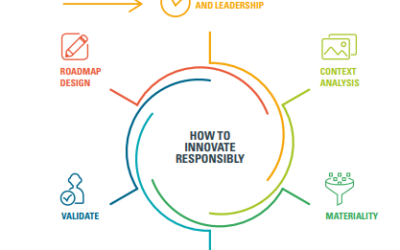
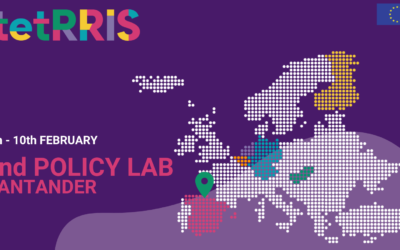
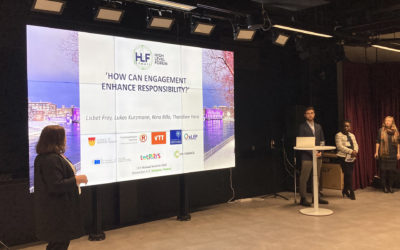
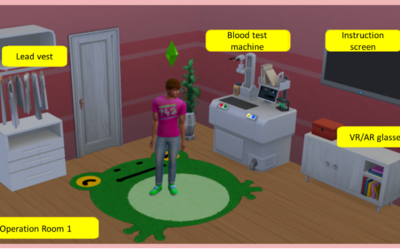

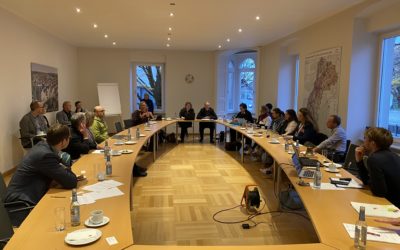

0 Comments